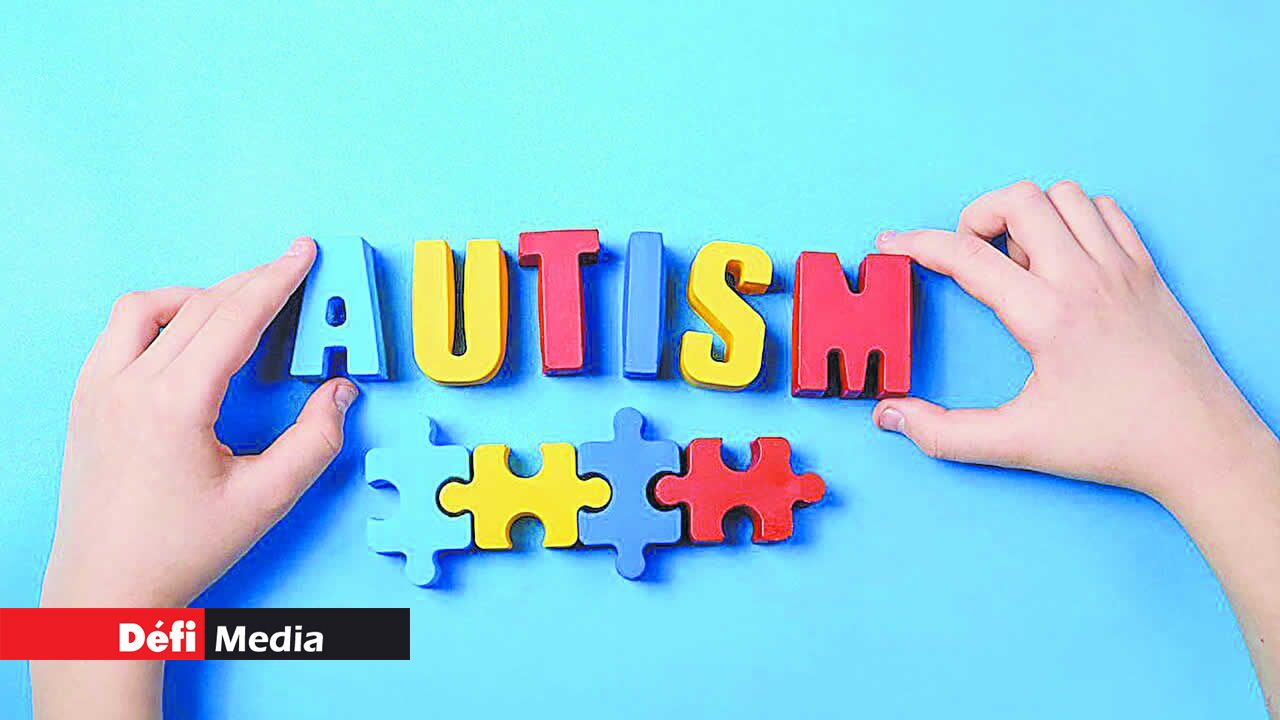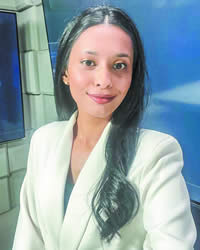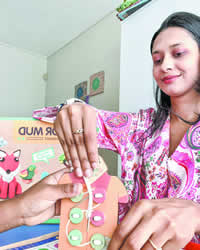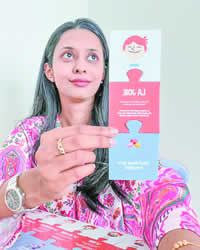
In today’s evolving world, awareness about autism, officially termed autism spectrum disorder (ASD), has grown significantly, but much remains to be done in fostering understanding and acceptance. Autism is a complex neurological condition that affects how a person communicates, behaves, and processes the world around them. The word “spectrum” reflects its varied manifestations; no two individuals experience autism in the same way.

In Mauritius, like in many parts of the world, autism remains under-discussed. Families often struggle with stigma, late diagnoses, and limited access to specialized care. While global movements have made strides in educating the public, local initiatives are just beginning to take root. To unravel the nuances of autism, its challenges, and its promise, we sat down with Aaisha Ally Jaun, a dedicated psychologist and behavioral therapist with years of experience supporting children with autism and their families.
“In Mauritius,” she says, “many parents hesitate to seek help due to fear of judgment or misinformation about autism. This leads to late diagnoses, which can delay critical early interventions.” She emphasizes that early recognition of symptoms and timely intervention are pivotal in shaping developmental outcomes.
At its core, autism affects how individuals perceive and interact with the world. Aaisha elaborates, “It’s a spectrum because the range of abilities and challenges varies widely. Some children might have profound communication difficulties, while others excel in specific skills, such as mathematics, art, or technology.”
Differentiating Autism from developmental delays
For parents, identifying autism can be challenging. Early signs may appear as young as 12 months and include limited eye contact, not responding to their name, or repetitive behaviors such as hand-flapping. “It’s important to differentiate between typical developmental delays and autism,” Aaisha notes. “For example, while many children may speak late, those with autism might also exhibit restricted interests or avoid social interactions.”
“Children with autism may exhibit a wide variety of strengths, such as exceptional abilities in art, music, or specific areas like math or memory. These unique strengths often go unrecognized when children are mistakenly categorized with general developmental delays,” Aaisha notes. While developmental delays typically refer to a broad delay in a child’s development across multiple areas, autism is a specific neurological condition that presents a complex range of behaviors and abilities. Understanding the distinction between these two is crucial for providing accurate diagnoses and interventions.
Children with autism may have delays in some areas, such as communication or social interaction, but they often show remarkable skills or talents in other domains that do not align with general developmental delays. For example, a child with autism might struggle to engage in conversation but may demonstrate extraordinary abilities in pattern recognition or an advanced understanding of a specific subject, such as astronomy or chess. These capabilities can sometimes be overshadowed by the focus on their challenges, leading to missed opportunities for growth and support.
Recognizing that autism is not just about delays, but also about a unique way of perceiving and interacting with the world, is key. It is essential to differentiate between autism and other developmental delays so that children can be provided with the appropriate resources and strategies tailored to their specific needs. This understanding can lead to more effective support systems, ensuring that a child’s strengths are nurtured while their challenges are appropriately addressed.
The importance of early diagnosis
Delaying diagnosis has long-term consequences, including missed opportunities for early behavioral therapy, speech therapy, or occupational therapy. “By three years of age, the brain’s plasticity allows for remarkable progress through targeted interventions,” Aaisha explains. Research underscores that children who receive therapy early on achieve better outcomes in social skills, language, and emotional regulation.
Mauritius faces unique challenges. Many families lack access to trained professionals who can recognize autism. “Parents often visit pediatricians who may not always spot the signs especially when kids are high functioning.” she says. Early screening programs and parental education campaigns can bridge this gap.
Family: a pillar of support
Families play a crucial role in supporting children with autism. “Consistency at home reinforces what children learn in therapy,” Aaisha explains. For example, if a child is working on communication skills, parents and siblings can practice these at home. “Families also help by reinforcing therapy strategies learned at school or through external sessions, ensuring that these strategies are carried over into everyday life. This consistency is key to making meaningful progress,” she adds.
Siblings, too, have a unique role. “They provide companionship, model social interactions, and offer a sense of normalcy,” she says. Encouraging open conversations within the family about autism can foster empathy and understanding.
Balancing the needs of a child with autism with those of other family members can be challenging. Aaisha suggests parents create individual time for each child, involve siblings in caregiving in simple ways, and prioritize self-care.
For Aaisha, her work is “incredibly rewarding,” as she describes witnessing small but meaningful progress in her clients. A typical therapy session involves breaking down tasks into manageable steps, using techniques like reinforcement to encourage positive behaviors.
“When I see a child achieve a milestone, like learning to express a need or engaging in play for the first time, it’s an indescribable joy,” she shares. She also highlights the importance of building trust with both the child and their family. Therapy isn’t just about the child - it’s a collaborative effort involving parents, siblings, and caregivers.
Hope for the future
The future for children with autism is brighter than ever, thanks to growing awareness, technological advancements, and early intervention programs. Aaisha is optimistic: “With the right support, children with autism can lead fulfilling lives, form meaningful relationships, and achieve their potential.” She emphasizes that the journey is not without challenges, but resilience, community support, and education make a world of difference.
As Mauritius moves forward, creating a more autism-friendly society is a collective responsibility. Schools can implement inclusive policies, workplaces can adapt to neurodiverse employees, and communities can foster environments where differences are celebrated. For parents, the journey begins with understanding and acceptance. Aaisha advises, “Celebrate every step forward. Progress may be slow, but it’s always meaningful.”
Additionally, it’s essential for local governments to provide financial support for therapies, early diagnosis, and family counseling, ensuring that resources are accessible to all families, regardless of their socio-economic status. By embracing these principles, we can create a world where children with autism and their families feel valued, supported, and empowered.
Tips for spporting a child with autism
“In addition to focusing on strengths, it is important to recognize sensory sensitivities. For instance, some children may have heightened sensitivity to touch, noise, or textures, which can be alleviated through a calming, sensory-friendly environment,” Aaisha advises. Understanding a child’s sensory needs helps ensure they feel more comfortable and secure in their surroundings.
Ever wondered why some people see the world differently? Autism Spectrum Disorder is a complex condition that influences how individuals communicate, behave, process information, and perceive the world. While awareness has increased, understanding and acceptance remain crucial. Autism isn’t a one-size-fits-all condition. It’s a spectrum, encompassing a wide range of abilities and challenges. As awareness grows, let’s strive for a world that embraces neurodiversity.
Practical advice for parents

Aaisha offers several practical strategies for parents raising children with autism that can make a significant difference in their development and overall well-being:
Celebrate strengths: “Every child has unique abilities,” Aaisha emphasizes. “Whether it’s an aptitude for a particular subject, an artistic talent, or a knack for solving puzzles, focusing on these strengths helps boost a child’s confidence and morale.” By recognizing and celebrating what children excel at, parents can encourage a sense of accomplishment and self-worth, which fosters a positive self-image. Rather than focusing solely on challenges, nurturing their abilities allows children to feel valued and motivated.
Establish routines: “Predictability reduces anxiety and helps children feel secure,” she advises. Children with autism often thrive on structure, as it provides them with a clear sense of what to expect throughout the day. Whether it’s a consistent morning routine or a set schedule for activities, having a predictable pattern helps children feel more in control of their environment. This routine can be reassuring and reduce stress or confusion, particularly in unfamiliar situations.
Encourage communication: “Communication is at the heart of understanding and connection,” Aaisha explains. “Whether through speech, sign language, or visual aids, it’s important to help your child express themselves in a way that feels comfortable for them.” Communication might look different for each child, and it’s vital for parents to explore multiple avenues such as using picture boards, gesture-based communication, or alternative speech devices to empower their children to share their thoughts, needs, and emotions.
Create autism-friendly spaces: Sensory sensitivities are a common feature of autism, and Aaisha stresses the importance of creating environments that help children regulate their emotions. “Sensory-friendly spaces, with soft lighting or quiet corners, can provide a calm haven for children when they feel overwhelmed by too much stimulation.” Creating these safe spaces where children can retreat to when needed allows them to feel comfortable and grounded. Small adjustments, like soft textures or noise-canceling headphones, can go a long way in supporting emotional regulation.
She also adds, “Take care of yourself as well. Parenting a child with autism requires patience and resilience, and self-care is essential.” Raising a child with autism can be an emotionally and physically demanding journey, and parents must remember to prioritize their own well-being. Taking time to rest, seek support, and engage in activities that replenish their energy is key to being able to provide the best care for their child. By nurturing themselves, parents are better equipped to navigate the challenges that come with raising a child on the autism spectrum.
School and society: keys to inclusion

Schools are vital in shaping a child’s development. Aaisha advocates for individualized education plans (IEPs) tailored to each child’s needs. She urges parents to maintain open communication with teachers, monitor progress, and advocate for inclusive practices.
Mauritian schools, like many globally, are gradually becoming more inclusive. However, gaps remain. “Teachers need more training on how to support neurodivergent students,” she says. Collaboration among schools, therapists, and families can create better outcomes for children.
Another important factor is advocating for your child’s specific needs in the classroom. “This might involve adjusting the classroom environment, such as creating a quiet space for the child to retreat to when overwhelmed, or offering additional time for tasks,” she suggests.
On a societal level, awareness campaigns are crucial. “Autism-friendly policies in workplaces, healthcare systems, and community spaces can make a huge difference,” Aaisha adds.
Dispelling myths about Autism
One of the biggest misconceptions, Aaisha notes, is the idea that all children with autism are the same. “Autism is not a one-size-fits-all condition,” she stresses. “Some children may excel in academics while struggling socially, and others might have difficulty communicating but thrive in creative fields.”
Another myth is that children with autism cannot form emotional bonds. “On the contrary,” she says, “these children often form deep connections, though they may express them differently.”
Such misconceptions often lead to stigma, which can isolate families. Parents, she advises, should take an active role in educating those around them. “Sharing your child’s strengths and stories can create understanding,” she suggests.
Behavioral therapy: a beacon of hope
Behavioral therapy is one of the most effective interventions for autism. It involves breaking down complex skills into smaller steps and using positive reinforcement to encourage progress.
“Behavioral therapy doesn’t just focus on reducing problematic behaviors but also aims to build skills and teach alternative, more appropriate behaviors. For instance, if a child engages in repetitive behaviors, therapists may work on helping the child express their needs or emotions more effectively through communication,” she explains.
“Therapy focuses on areas like communication, self-care, and social skills,” Aaisha explains. For instance, a therapist might teach a child to make eye contact during conversations or to use a picture card to request food. Over time, these small victories help to build confidence and independence.
Reaching out for support
For parents or individuals seeking further information or guidance on autism, Aaisha Ally Jaun, a psychologist and behavioral therapist with extensive experience in the field, can be reached at 58137992. She offers professional advice and tailored support to families navigating the challenges and rewards associated with autism.

Notre service WhatsApp. Vous êtes témoins d`un événement d`actualité ou d`une scène insolite? Envoyez-nous vos photos ou vidéos sur le 5 259 82 00 !























